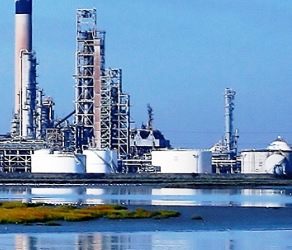Flood of Russian diesel puts European refiners under pressure
By JENNY GROSS
LONDON -- Russia's slowing economy is leading to a flood of Russian diesel flowing to Europe, which could force a new round of European refinery closures.
Europe's refineries -- which turn crude oil into products such as gasoline and diesel -- are already under pressure as the continent's weak economy reduces demand for their output, dragging down prices and reducing profit.
 Such pressure has already resulted in at least 16 refineries in the region shutting crude capacity or indicating they plan to do so since 2008, and now diesel profits are being squeezed further by the influx of Russian fuel.
Such pressure has already resulted in at least 16 refineries in the region shutting crude capacity or indicating they plan to do so since 2008, and now diesel profits are being squeezed further by the influx of Russian fuel.
Russia's Baltic Sea exports of diesel to northwest Europe have risen to nearly 500,000 bpd from 300,000 at the same time last year, according to ESAI Energy, an energy consultancy.
The rise in exports comes as Russia's economy weakens with a subsequent lower demand for the country's commodities, and analysts expect the export trend to continue as Russian refiners look to sell their diesel abroad to make up for the waning domestic demand.
The flood of fuel comes as weak demand weighs on the price of diesel, which is trading at $865.75/ton compared with $946/ton this time last year, and reduces refiners' profit margins. Refiners make about $14.83 refining a barrel of diesel compared with $17.10 a barrel a year ago, according to an analysis by The Wall Street Journal.
While the profit refiners still make on diesel may look healthy, the refiners need to earn as much as possible from diesel because profit from the fuel typically offsets losses on other products.
"When these diesel imports increase too much, refining profits come under pressure," said Andrew Reed, senior analyst at ESAI.
"The more diesel that comes in from external suppliers, the shakier the ground is for the most vulnerable refiners," Mr. Reed said. This year will be much less profitable than 2012, he said, and 2014 will be markedly worse.
Recent investment in Russian refineries has improved their capacity and is allowing Russian diesel to be supplied directly to the European market, whereas previously its exports needed treatment before meeting European diesel standards, according to a report published earlier this month by UKPIA, a trade group representing refining in Britain.
Russian refiners are unlikely to reduce production in line with local demand because the country's oil export duty gives refineries an incentive to refine as much product as possible.
Massimo Vacca, head of investor relations at Saras, one of Italy's biggest oil refiners by capacity, said the company would watch closely to see if the increase in exports from Russia would lead to weaker diesel margins.
But he said this would be difficult to ascertain in the coming months, because diesel margins typically fall in the summer when there is lower need for heating fuel.
"Demand is on a downward slope and imports are on the rise overall," Mr. Vacca said. "Whether diesel is coming from one end or the other, it doesn't make a difference: The point is European refiners are under pressure. They're faced with one of two choices--close down or invest."
Saras SpA in March reported a net loss of 90.1 million euros ($116.5 million) for 2012, partly because of lower refining margins.
Lower demand because of fissures in the European economy has already led to refinery closures across the region. Swiss-based Petroplus filed insolvency in 2012, leading to the temporary or full closures of its Antwerp plant, the Petit Couronne refinery in France and the Swiss Cressier refinery, after falling demand meant it could no longer finance operations.
LyondellBasell has also reduced capacity, mothballing its 105,000 bpd Berre refinery in France in 2012 because of low demand for products in the region and rising competition from refiners in the Middle East and Asia, which cut into its profits.
In total, recent closures have eliminated 1.6 million bbl of crude distillation capacity -- about 10% of total 2008 capacity in European Organization for Economic Cooperation and Development countries capacity -- according to ESAI.
"There's a lot more diesel moving around than there has been," said Gemma Parker, downstream consultant at Facts Global Energy. She said refineries in northwest Europe, where most of the Russian Black Sea exports are headed, are most likely to be hit.
To be sure, Europe does need to import diesel to meet demand.
Many refineries in Europe were built decades ago and are geared toward producing more gasoline, rather than more-economical diesel, for which there is now higher demand.
As a result, Europe demands more diesel than its refiners can provide, meaning it depends on some diesel imports from Russia and the Middle East to keep vehicles and industry running. European cars are geared toward diesel, while cars in the US tend to operate most efficiently on gasoline.
However, the increase in diesel exports from Russia comes just as Saudi Aramco ramps up its refining capacity to produce more diesel and gasoline, meaning the global market is awash with fuel.
The International Energy Agency said in a report published May 14 that global refinery runs, or volume of oil products produced by refineries, will jump by an unusually steep 3.6 million bpd from April to August, from 75.1 million bpd in the first quarter of 2013, boosted partly by new capacity from Saudi Arabia.
European refiners are also being hit in the gasoline market, says Jason Gammel, head of oil and gas research at Macquarie, who said US refiners have significantly increased exports of gasoline over the past few years.
"They're [European refiners] kind of getting squeezed by both ends," Mr. Gammel said. "When demand decline and supply increases, it generally means lower profitability."
Dow Jones Newswires






Comments